The most spectacular manifestation of an accelerating trend is when its progression becomes exponential or more.
An exponential progression is clearly unsustainable in the real world reaching very quickly a collapse point of the underlying process.
In case of accelerating technological development, the collapse point is generally identified with the so called Singularity, caused by the rise of self-improving Artificial Intelligence.
This is well known and widely debated, but it is only part of a bigger story.
It is now emerging that there are many other accelerating trends we should worry about.
Taking a wider look of what is going on with us and our planet we could say that there are various “singularities” that are lining up and coming our way. This is not good news and, besides the intrinsic risk represented by accelerating trends, the significance of what is about to happen is very profound.
If we accept a generalized definition of Singularity as a point in time where control is lost as the consequence of processes breaking down because of an excessive rate of change, then we could say that we are approaching at least five Singularities.
They are all linked to each other and their progression is often more than exponential.
Evolutionary Singularity
Beside the classical Technological Singularity triggered by self-improving AI, there is another singularity where humans are at the center stage.
Evolution of intelligent life led to technology and technology is leading to the ability to intervene in the evolutionary process modifying our own characteristics by design.
The old lengthy natural process of waiting for random changes to be tested by natural selection in order to become permanent features of living beings will be shortly replaced in human beings by technology through genetic modifications and technological augmentations of our bodies and minds.
Changes will no longer be random, they will be planned to serve a purpose and the process will become proactive and not reactive, making it billion of times more efficient and faster. As technology accelerates dragging everything with it, we will have to also change in order to keep up.
This process constitutes an accelerating feedback loop; the more technology improves, the more we improve our capabilities creating better technology which, in return, will be used to improve us even more.
Technology is incompatible with the way we have been living until now and as it accelerates we will have to adapt faster and faster to the new environment. Failure will result in extinction.
We are on the verge of an epochal transition; we are passing from an era driven by Natural Evolution to an era driven by Artificial Evolution and, at the transition point, we will encounter a Singularity.
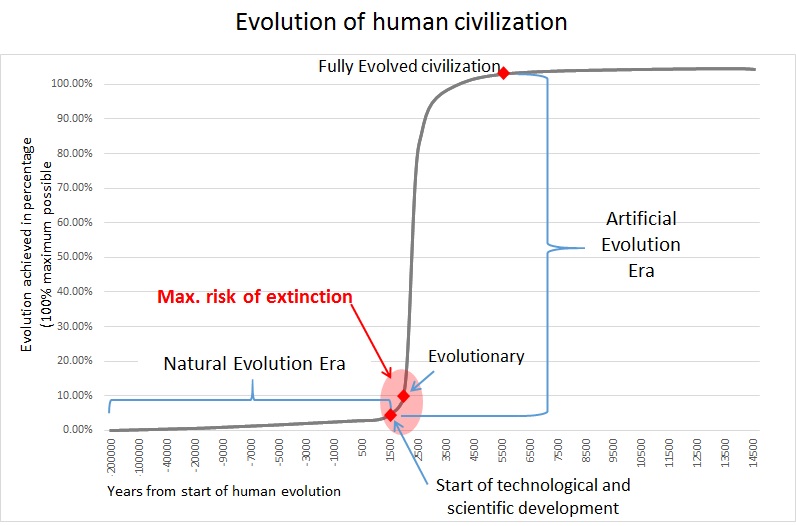
Ecological Singularity
The Ecological Singularity is caused by the ecosystem degradation. The main accelerating trends that are causing the natural world to degrade are the following:
- World population growth and the improvement of the standard of living especially in Asia.
- Resources over consumption
- Deforestation and land conversion
- Accumulation of nutrients and reactive nitrogen in the environment
- Loss of biodiversity and ecosystems
- Greenhouse gases concentration in the atmosphere
When drafted in the appropriate scale, all parameters that typically describe the above processes show accelerating exponential trends often exceeding the exponential progression.
In some cases a new curve had to be invented, such as the “Hockey Stick” curve dubbed by the climatologist Jerry Mahlman when he reconstructed the Northern hemisphere mean temperature of the past 1000 years, combining a variety of measures, into a graph that showed a sharp turn upward since the start of the industrial revolution.


The world population growth, once seen on a scale of few hundred years has the same worrisome shape. The resources consumption is even more pronounced caused by the West where pro capita consumption is many times that of the rest of the world.
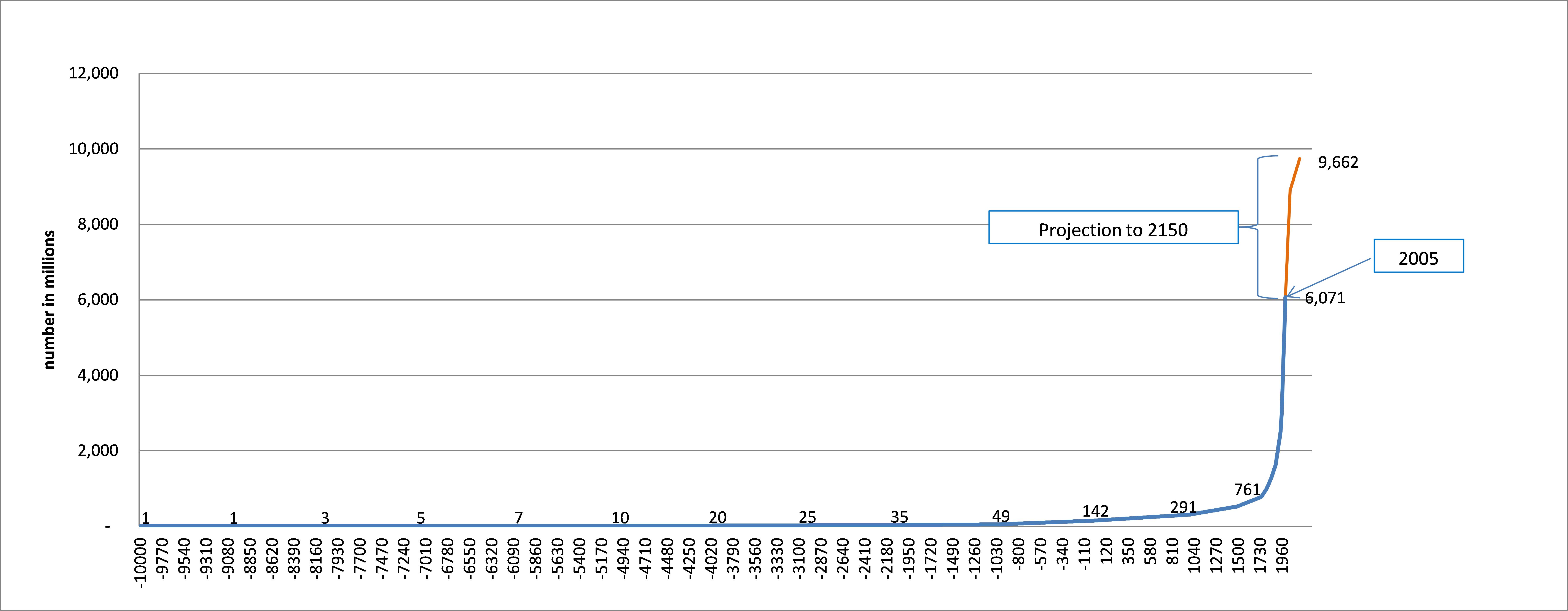
The loss of primary tropical forests, which are the richest in biodiversity, is staggering: we have already lost an unimaginable quantity of natural habitat including Madagascar, Borneo and by 2050 most of the remaining primary forests will be converted to croplands or unproductive wastelands.

The loss of biodiversity is reaching an unstoppable and unbelievable rate showing that we are in the middle of a mass extinction. This mass extinction has been already named as the Permian extinction which will be the sixth global mass extinction in the history of our planet and one of the most severe.
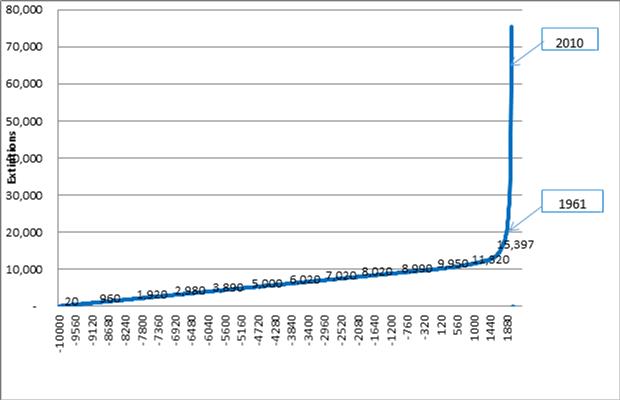
But, perhaps the most dramatic trend of all is the increase of greenhouse gases concentration in the atmosphere. When seen at the appropriate scale of few hundred thousand years it shows a sudden spike that towers above all past fluctuations over the last 600,000 years. By 2050 it will be 2 1/2 times the highest ever for the above period.

If we consider that such fluctuations are correlated with the ice ages cycle, the obvious consequence is that the impact on climate will be two to three times more the difference between ice and warm ages. We have no idea what this means, we don’t know if it will be a world we could live in.
These trends are the vital signs of the natural world and, once shown next to each other, it is like looking at monitors recording the conditions of a terminal patient with no hope of recovery.
We are approaching a collapse point of the ecosystem beyond which we cannot predict what will happen. Many negative feedbacks will trigger self-feeding loops impossible to control. At that point we will hit the Ecological Singularity.
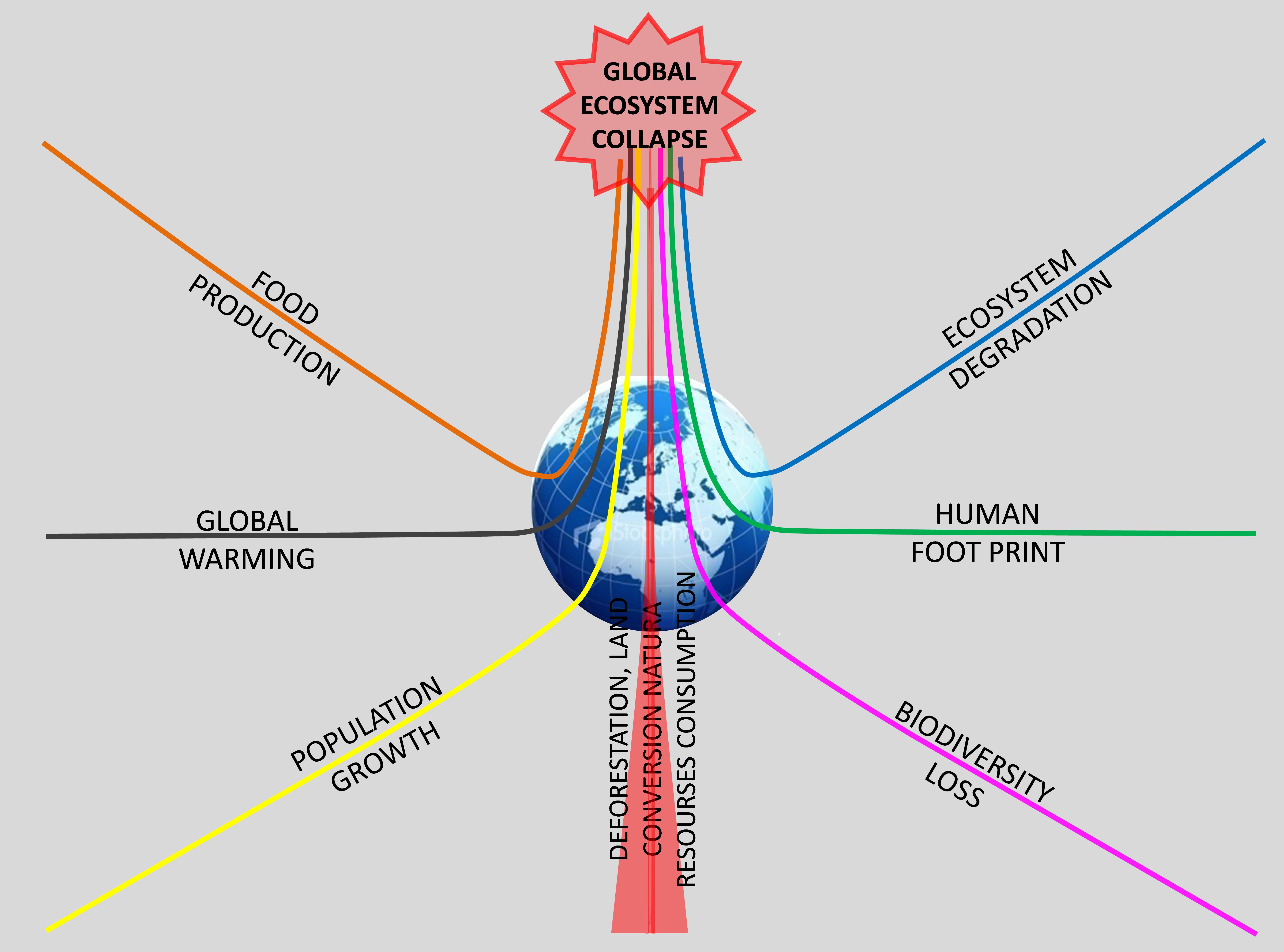
Carbon Singularity
Cheap access to light and sweet conventional crude oil fueled the world’s growth and prosperity for over 100 years. Our economic system has been built around cheap oil availability assuming that this will always be available.
The current and future production of energy from renewable sources is nowhere near to alleviate our thirst for liquid fuels.
Renewable energy production cannot replace liquid fuels, for the following reasons:
- Wind and solar energy can only partially contribute to electricity generation
- Electricity is not generated with oil therefore wind and solar energy will not reduce oil dependency
- Bio fuels will only have a very limited share because it competes with food production.
According to the IEA the new renewable energies sources will only account for 2.3% of the total world primary energy production by 2030.
The powerhouse of our civilization is still the old loved carbon atom. We are, and will be for a long while a hydrocarbon powered civilization.
It is oil that made possible the spectacular rise of the modern society and the mechanized mass production of food, and with it, the population exploded.
Oil production is linked to food production by a relationship which has been constant for decades. For each ton of grain produced in the world, an average of 13 barrels of oil has been consumed.
The continuous increase of the world population and the improvement of the living conditions in Asia will require more food which in turn requires more land conversion and more oil.
The quantity of grain per capita has increased steadily up to the current 350Kg/year. An acceleration of this trend, led by China, is expected.
However oil and land availability is not infinite.
The crude oil production is probably peaking now and it will start a relentless decline in the near future.
As production is reaching the peak we assist to a shift toward “unconventional” sources like tar sands, shale gas. These are harder to extract, often with negative energy return on energy invested. Their typical bell shaped production curve is much sharper than conventional crude and they will reach their relative peak very quickly. These unconventional sources could provide only a temporary relieve to a growing global demand.
Our dependency from oil makes extremely dangerous running into a situation of limited supply and increasing demand without a viable alternative. We risk an unprecedented crisis of food production combined with the collapse of road transport with unimaginable consequences.
We are therefore approaching an uncharted territory where, for the first time, we will have to deal with an accelerating trend of fuel starvation and very high prices.
Our complete dependency from oil is astonishing.
We have taken risks on global scale which no reasonable person would ever take in their own life or business.
We broke the most basic rules of rational management:
- We didn’t diversify our main source of energy for transportation and food production.
- We over consumed our most precious resource accelerating its consumption as reserves decrease.
- We didn’t plan for the future.
For centuries we didn’t think a second to an alternative for oil. We built everything around it, we became addicted and we became totally carbon dependent.
A world without oil will be a very different one.
Air travel will significantly shrink and disappear as a means of mass transportation. The model of our modern cities based on large suburbia served by shopping malls and long range commuting will be no longer viable. We will have to rethink completely the way we produce and distribute food and goods.
Does it mean that the global population will have to retrieve to numbers closer to the pre-oil era?
The oil era carries a sinister irony for human kind. Oil made our technological world possible but, in return, we have fallen in a vicious feedback loop.
Oil was created 180 million years ago by mass extinction caused by global warming. Organic matter accumulated on the oceans floor and in millions or years turned into oil and, with it, the excessive carbon has been confined underground.
We discovered oil 180 million years later, extracted and burned it, releasing back the old CO2 into the atmosphere resuming global warming which is causing mass extinctions once again.
We have recreated the same cycle backwards but at a speed one hundred thousand times faster leading to a new cycle of oil formation. We may become the fuel that new intelligent species, evolved as a consequence of the Pliocene mass extinction, will use 180 million years in the future. [See a short slide presentation on the above oil cycle here: https://drive.google.com/open?id=0Bw2Y7zjijLaTZHdoU21uZUt2VFU]
What we did with oil isn’t the smartest thing to do and most probably is the stupidest thing in human history. A time bomb was set by the discovery of oil and by our ignorance – in terms of emissions and resource dependency.
The transition from the hydrocarbon economy to the next economy will likely be, by no means, smooth and gradual, it will be a global shock of unimaginable proportions.
The oil era and the way it is going to end will have unpredictable consequences on the planet and on us as a civilization, with connotations similar to a “singularity”, the Carbon Singularity.
Economic Singularity
The orthodox economic model at the foundation of the modern society is based on continuous indefinite growth and on an ever increasing supply of energy and resources. As a matter of fact the world economy has been growing at steady level of 3% per year on average.
A constant 3% steady growth could appear not much but this impression is wrong; growing at this rate we will need about 5 planets to support our civilization by 2050.
The classical economic model is clearly unsustainable and it will hit various hard constraints in the near future due to limited resources, the obvious limitation of the number of planets available and the collapsing ecosystems.
Beside these hard limitations there are many other disruptive forces at work that risk to destabilize the entire economic model. One of the most relevant is the rising of a new economy based on zero marginal cost enabled by the new technologies and internet.
Various industries have been revolutionized already with massive corporations being crippled because they couldn’t adapt to changes occurring too fast. From the music industry, to photography and telecommunications we have already seen a disruptive revolution with costs approaching near zero for the end consumer.
The next step will be the sharing of goods, properties and assets, such as self-driving cars and the distributed generation of electricity.
In parallel, virtual currencies are making their way to the global scene having the potential to replace conventional currencies revolutionizing the economy from within.
Technological unemployment will be another powerful disruptor of our economic model considering the enormous possibilities of narrow AI and robotics. The continuous increase of life duration and the consequent number of aging people, combined with the technological unemployment, will bring the collapse of social welfare systems across the world.
All of these elements influence each other and will occur simultaneously causing an accelerating rate of change of great complexity leading to a singularity, the Economic Singularity.
Where are we heading?
We have been inebriated by few decades of opulence made possible by oil after thousands of years of sufferance and misery. We are confused by the unbelievable acceleration and power of our technologies and their impact on our future and our planet.
We have not evolved mechanisms, either biologically or culturally to manage global risks. Our instinct of conservation has been shaped by our long experience with local risks such as dangerous animals, hostile people, storms, draughts, famines, diseases. These types of problems have occurred many times and we have evolved instincts to alert us of such risks while we are insensitive to global treats.
As tragic as these events are for the people immediately affected, in the big picture of things, from the perspective of mankind as a whole, even the worst of them is a mere ripple on the surface of the great sea of life.
Our approach to global existential risks cannot be one of trial-and-error. There is no opportunity to learn from errors. The reactive approach – see what happens, limit damages, and learn from experience, cannot work on an accelerating environment posing existential threats.
The main reason to be careful when you walk down the stairs is not that you might slip and have to retrace one step, but rather that the first slip might cause a second one, and so on until you fall dozens of steps and break your neck.
Similarly the concern about our civilization’s survival is not only related the effect of one specific cause of disruption but its vulnerability to the combined effect of many of them i.e. the chain reactions that could lead to a total collapse.
The intricacy and mutual feedbacks of these forces is extremely complex and dangerous.
We are clearly not on top of this dynamic, we are in the passenger seat and we are not even fastening our seat belt and bracing for impact.
But who is driving this car? Evolution is the driver, it drives everything.
We are approaching a fundamental step in the evolution of a civilization, an evolutionary jump that probably only few civilizations in the universe managed to overcome.
Evolution itself is reaching a singularity point and it is going exponential.
The evolutionary path of a civilization can be represented by a curve with a very slow rate of increase for hundred thousand years until it manages to develop science and technology. At that point the trend suddenly change course with a tremendous spike upwards.

With technology, come huge disruptions and singularity thresholds caused by accelerating trends. Only the civilizations that manage to harness the tremendous power of their own technology survive. Only civilizations that develop sufficient wisdom can keep evolving up to the next stage.
We don’t know where this adventure will take us but, one thing is sure, with a business as usual approach we will go nowhere. But if we manage to go through it, we will become Gods.
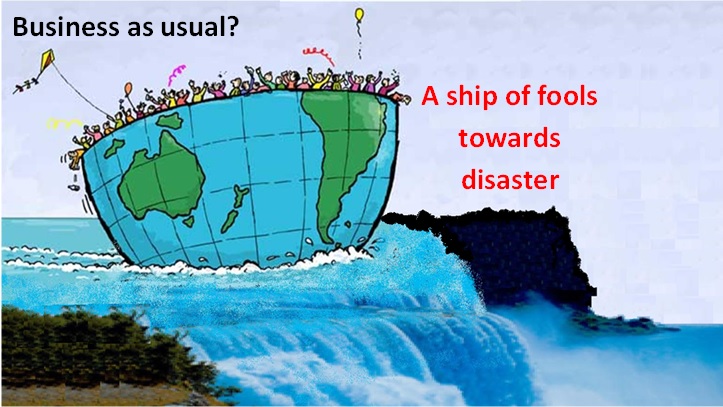
About the Author:
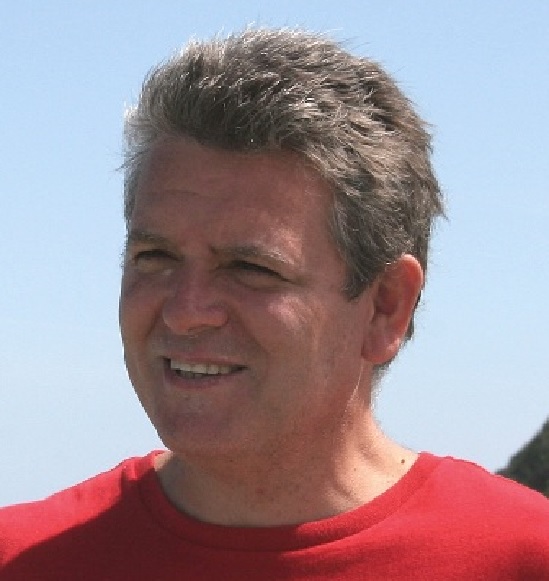 Marco Alpini is an Engineer and a Manager running the Australian operations of an international construction company. While Marco is currently involved in major infrastructure projects, his professional background is in energy generation and related emerging technologies. He has developed a keen interest in the technological singularity, as well as other accelerating trends, that he correlates with evolutionary processes leading to what he calls “The Cosmic Intellect”.
Marco Alpini is an Engineer and a Manager running the Australian operations of an international construction company. While Marco is currently involved in major infrastructure projects, his professional background is in energy generation and related emerging technologies. He has developed a keen interest in the technological singularity, as well as other accelerating trends, that he correlates with evolutionary processes leading to what he calls “The Cosmic Intellect”.

 On November 17, 2015 Singularity University Netherlands is organizing a
On November 17, 2015 Singularity University Netherlands is organizing a 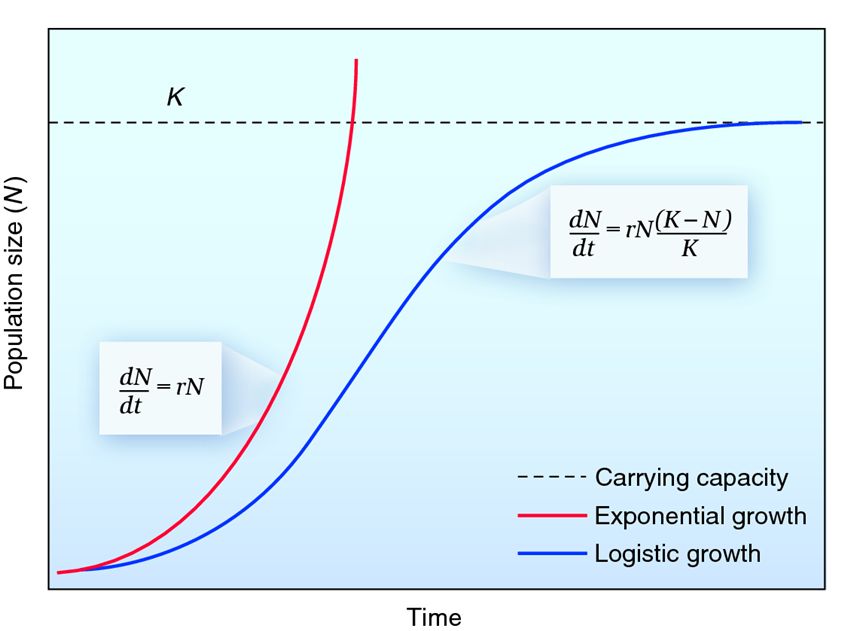
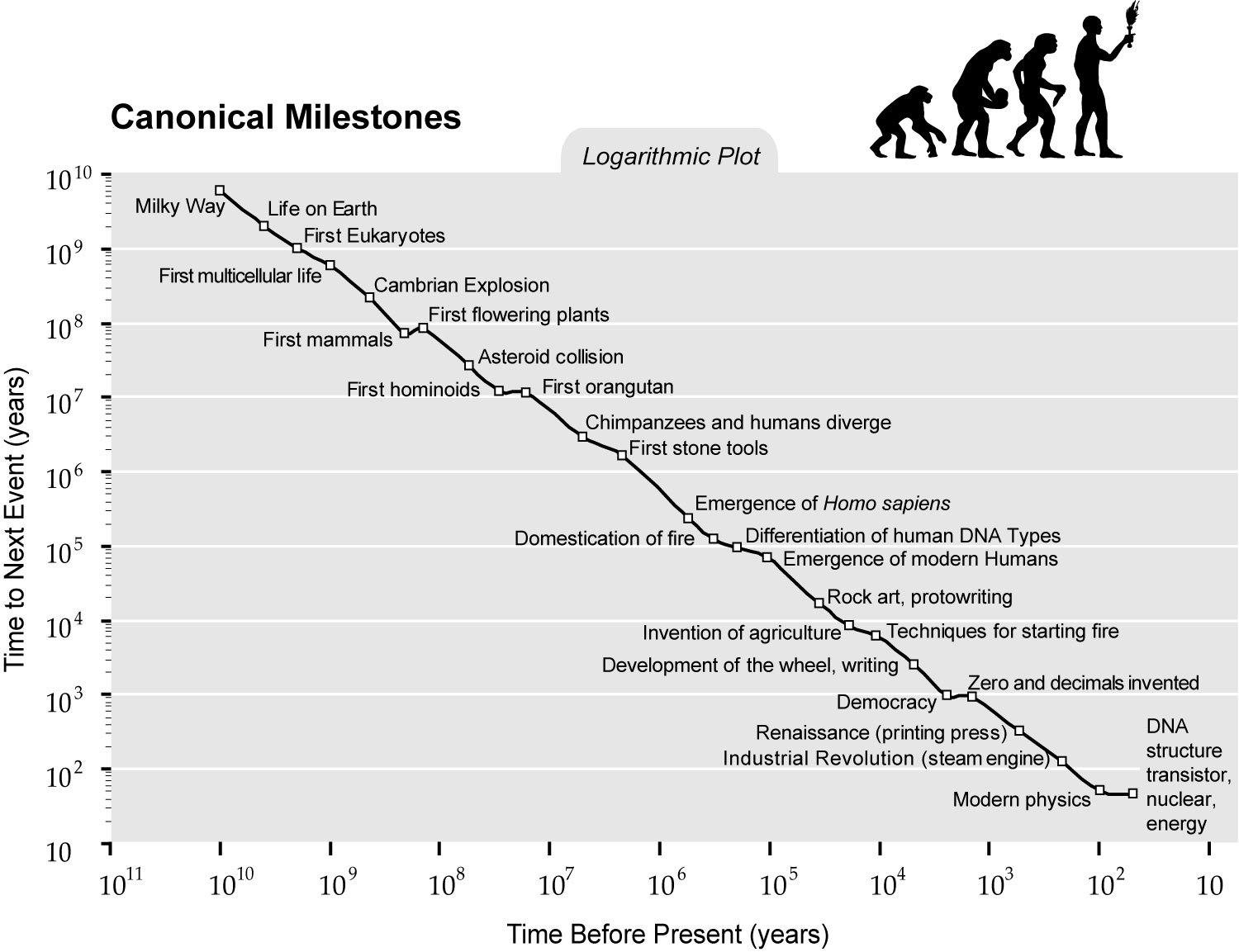
 Ask yourself how many versions of maps can be created to describe a single territory. And don’t limit yourself to maps that make sense, or that are sufficiently defined. Of course there is no limit to the possible number of maps, because maps are made of thoughts. The map is not the territory. The mind is not the brain. And with all due conceit I tell you, that if you can find a limit to your imagination, don’t let that convince you that there is a limit to mine, because mine has no limit.
Ask yourself how many versions of maps can be created to describe a single territory. And don’t limit yourself to maps that make sense, or that are sufficiently defined. Of course there is no limit to the possible number of maps, because maps are made of thoughts. The map is not the territory. The mind is not the brain. And with all due conceit I tell you, that if you can find a limit to your imagination, don’t let that convince you that there is a limit to mine, because mine has no limit.


 A few weeks ago I got interviewed on
A few weeks ago I got interviewed on  There are 3 individuals who have had the most impact on what I’ve been doing for the past 5 years: Ray Kurzweil – who helped me to see deeper into the exponential growth and disruptive nature of technology;
There are 3 individuals who have had the most impact on what I’ve been doing for the past 5 years: Ray Kurzweil – who helped me to see deeper into the exponential growth and disruptive nature of technology; 
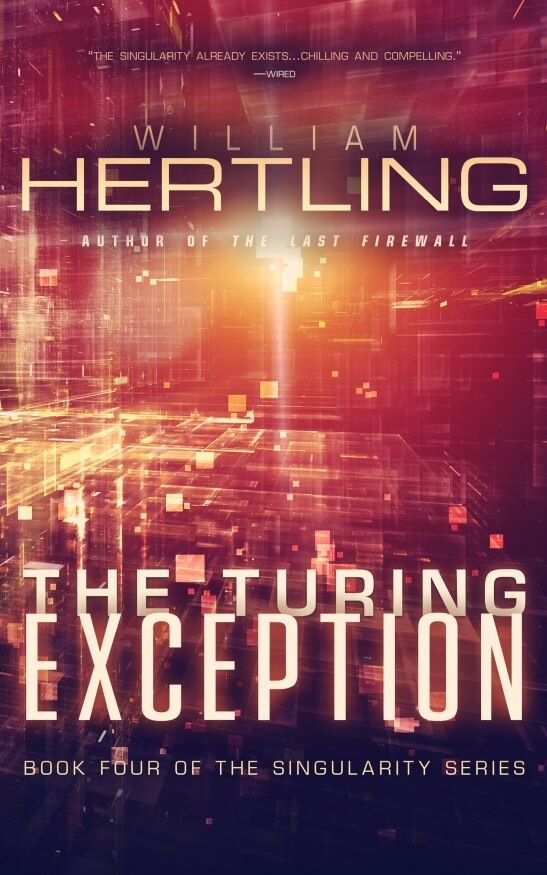 This is my second interview with
This is my second interview with  William Hertling is the author of the award-winning novels
William Hertling is the author of the award-winning novels  “I think the development of full artificial intelligence could spell the end of the human race” said Stephen Hawking.
“I think the development of full artificial intelligence could spell the end of the human race” said Stephen Hawking.
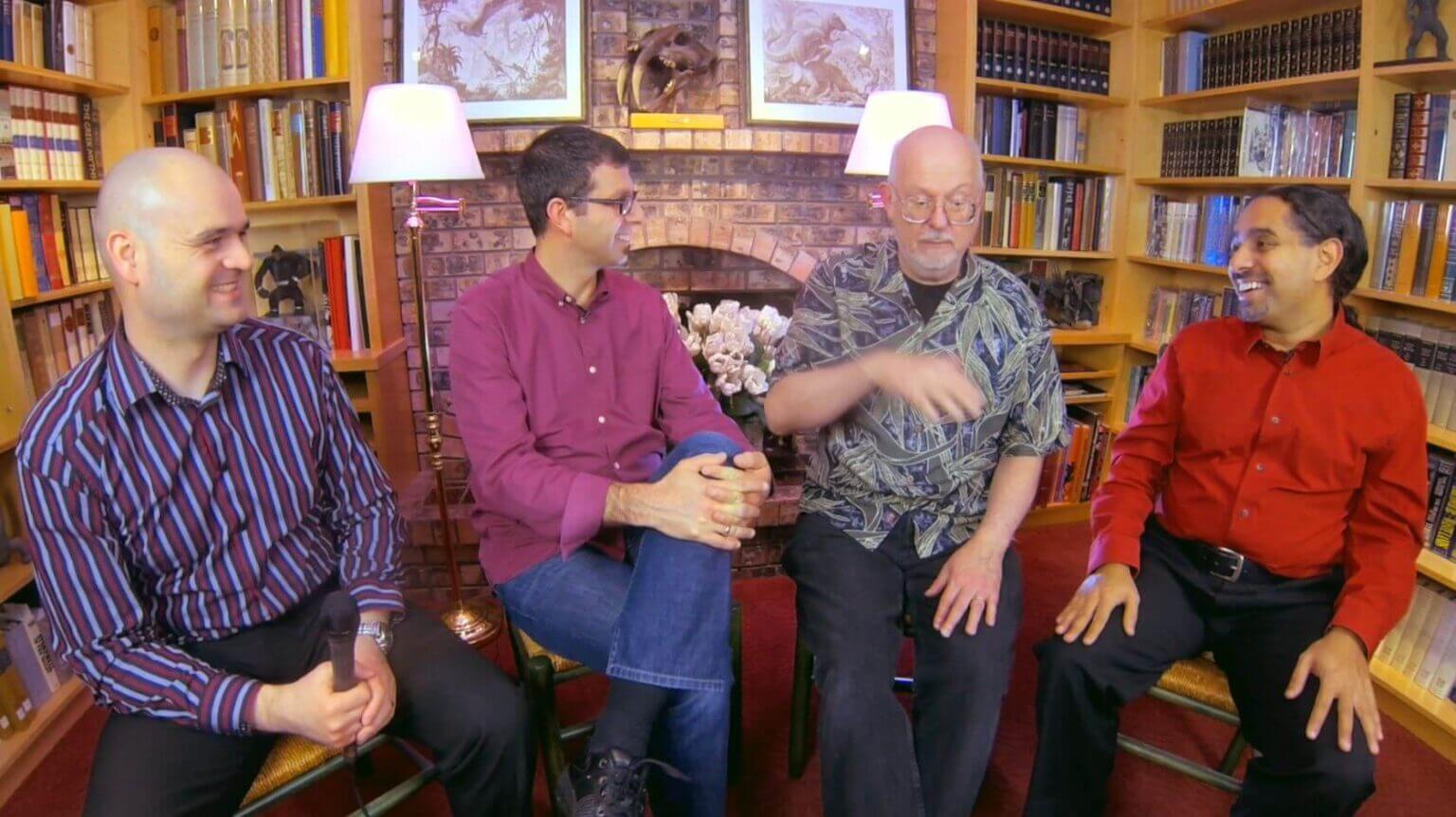 This is the concluding sci fi round-table discussion of my Seattle 1-on-1 interviews with
This is the concluding sci fi round-table discussion of my Seattle 1-on-1 interviews with 
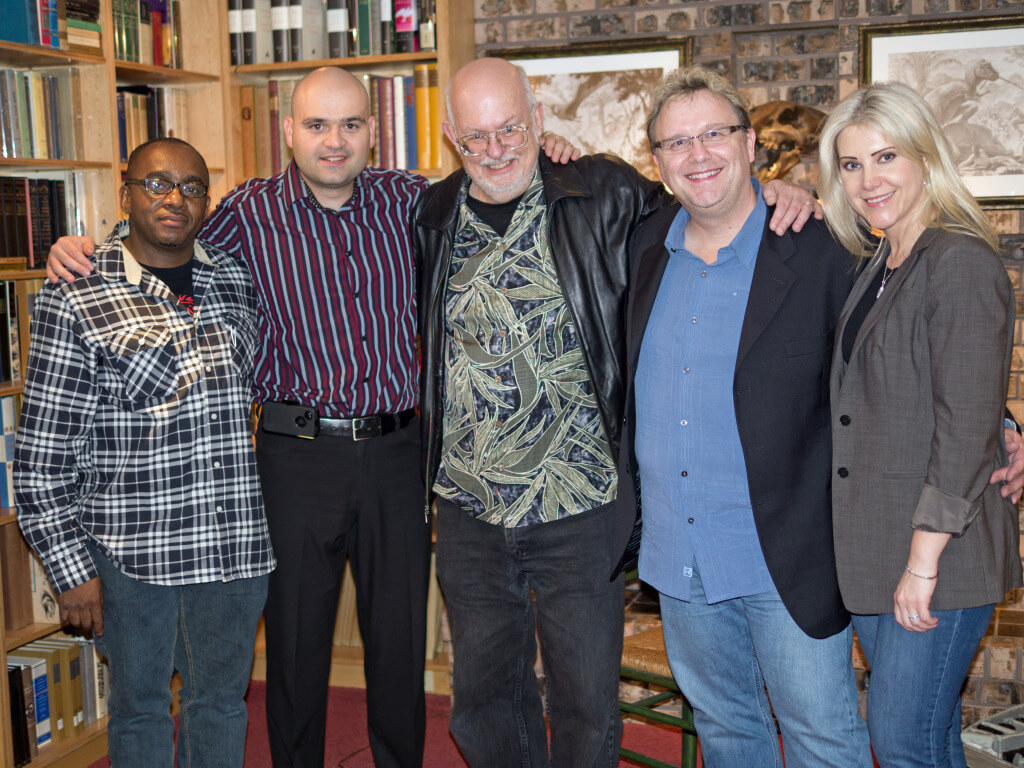
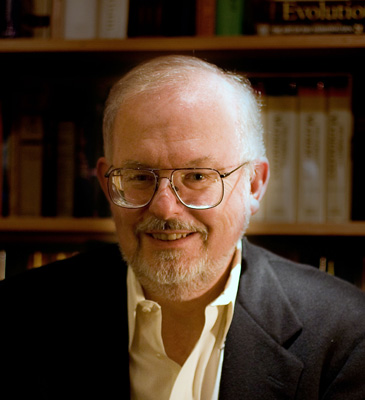 Greg Bear is the author of more than thirty books, spanning thrillers, science fiction, and fantasy, including
Greg Bear is the author of more than thirty books, spanning thrillers, science fiction, and fantasy, including 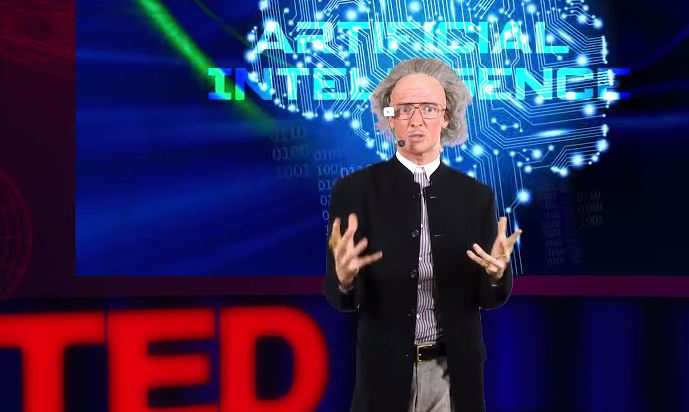
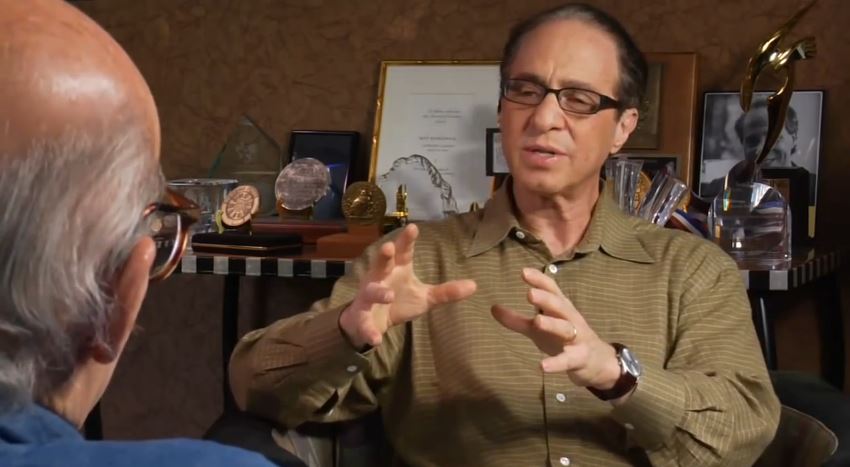 A classic interview where
A classic interview where